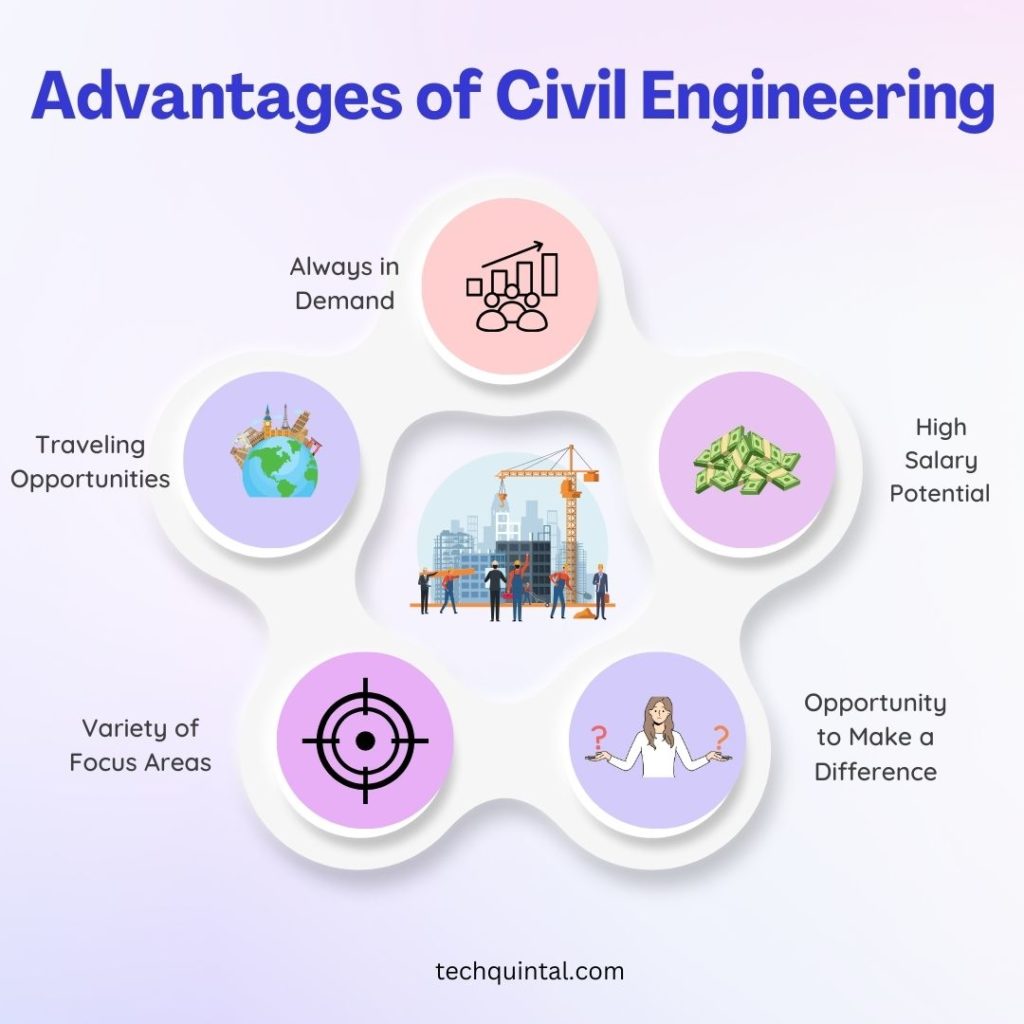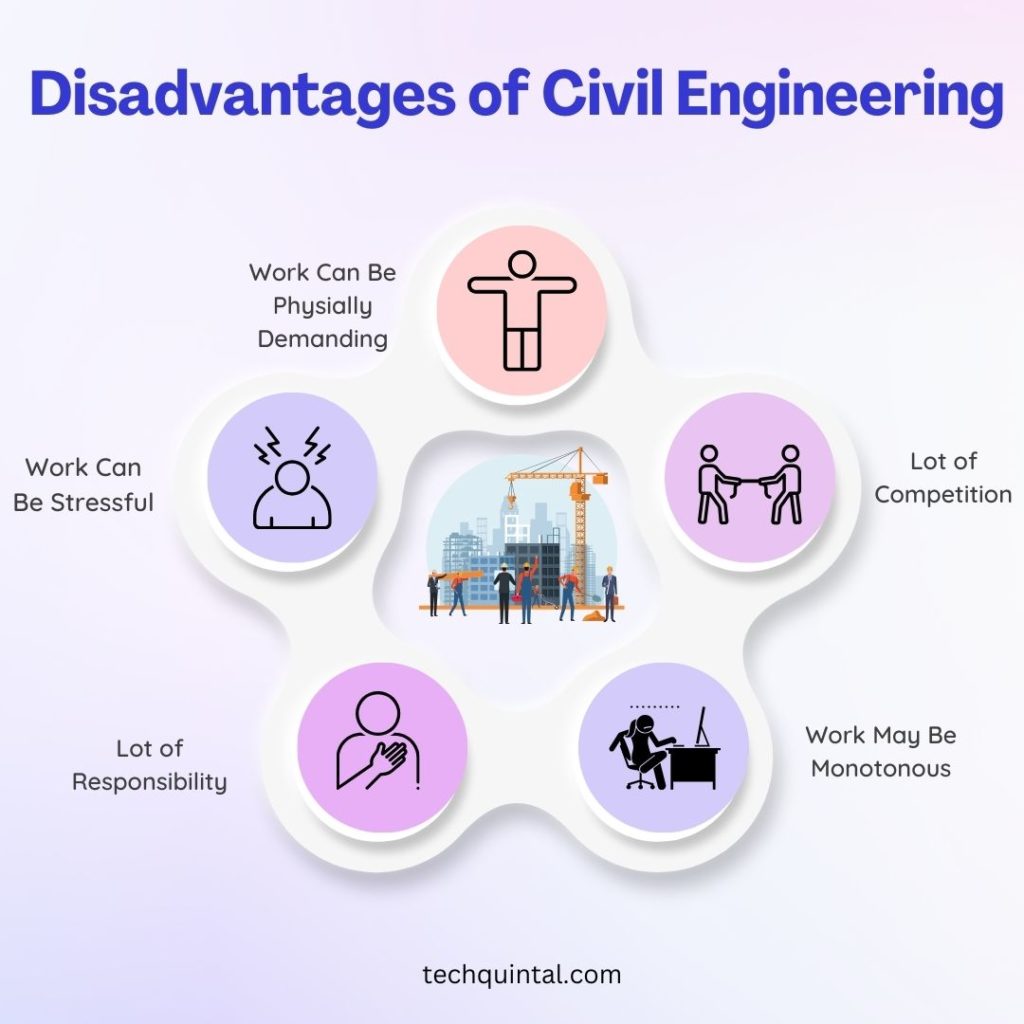
Civil engineering is a popular and diverse degree program. It involves designing, constructing, and maintaining physical and naturally-built environments and infrastructures such as roads, bridges, dams, and buildings. Some common specializations within civil engineering include structural engineering, geotechnical engineering, transportation engineering, and water resource engineering. Students can also focus on specific materials or technologies, such as steel or sustainable design.
In addition to traditional classroom learning, many civil engineering programs offer hands-on experience through internships and project-based courses. Many universities also have active chapters of professional organizations like ASCE (American Society of Civil Engineers) for networking and career development opportunities.
A Graduate degree is often required for advanced positions and leadership roles in the field. Many civil engineers also choose to become licensed professional engineers, which requires passing a standardized exam and meeting additional qualifications. Here is a look at the advantages and disadvantages of civil engineering if you are interested in this discipline.
What is Civil Engineering?

Civil Engineering is a common engineering branch. It deals with the design and construction of physical structures and infrastructures. Whenever there is a new building being built around your place or a new infrastructure has been updated, you can thank the Civil Engineers.
The engineers work on big projects like roads, bridges, buildings, dams, etc. Civil Engineering is not easy as it has to consider a number of factors in mind before starting the project, like materials, safety, budget, and environmental impact.
But Civil Engineers are not only useful to the world for creating big structures. They play an important role in disaster management and recovery as well. They put a lot of hard work into building structures that can handle natural disasters.
To be a civil engineer, you must be good at Mathematics and should be hard-working. Other skills that are required for becoming a civil engineer are problem-solving, physics, and material science.
Uses of Civil Engineering
When it comes to the uses of Civil Engineering, even sky is not the limit. Civil Engineers deal with all kinds of structures, from rock to bottom. Let us have a look at the most common uses of Civil Engineering and how one of the oldest branches of engineering is taking humanity in the forward direction:
- Infrastructure Development: Probably the most popular use of civil engineering. The big buildings and beautiful bridges we see are all given by civil engineers. They also construct roads, tunnels, highways, etc., that connect cities and countries together.
- Urban Planning: One of the best things about Civil Engineering is how easy it is for civil engineers to take up big projects. Urban planning is developing and planning urban areas effectively. From small residential houses to big city features, everything is done during urban planning.
- Water Resource and Environmental Protection: Civil Engineers are also used for developing big water supply systems for drinking, irrigation, and sanitation purposes. Not only that, they are always called to work on projects that protect the environment, like wastewater treatment plants, pollution control, etc.
What are the advantages of civil engineering?

Graduating in civil engineering means you are now a certified civil engineer. There are also many advantages of excelling in this area. So, these are the advantages of civil engineering:
1. Civil engineers are always in demand
According to the Bureau of Labor Statistics, the National Employment Estimate is 304,310. Thus, thriving economies and expanding populations increase the demand for modern infrastructure, making civil engineering a consistently high-demand field. The career option is also diverse, with civil engineers working in government agencies and private companies or even starting their own consulting businesses.
2. Higher salary potential
The average salary for a civil engineer is $86,640 annually, with top earners making over $130,000 annually. Entry-level positions often have competitive benefits and pay as well. In addition to traditional full-time work options, civil engineers may also have the opportunity to work on a contract or freelance basis for higher pay rates. As a skilled engineer, you can also start your own projects to earn extra income.
3. Opportunities to travel and see the world
Working as a civil engineer often means having the opportunity to travel to different locations for work. This could involve working on international development projects or providing consulting services to clients in other parts of the country. For many people, this is an attractive perk of the job. In addition, civil engineers often have the chance to see their completed projects firsthand, which can be a satisfying experience.
4. Variety of specializations and focus areas
As mentioned earlier, civil engineering is a diverse field with many specializations. This means that there is always something new to learn and ample opportunity to find a focus area that interests you. Whether you want to work on large-scale projects or focus on a specific material or engineering technology, there is likely a specialization.
5. Opportunities to give back and make a difference
Civil engineers have the opportunity to positively impact society by working on projects that improve infrastructure and quality of life. This could involve working on projects like cleaning up contaminated sites, developing sustainable buildings, or designing flood control systems.
For many people, this is one of the most rewarding aspects of the job. The governments also handle several projects for society’s good, usually involving a team of skilled and honest civil engineers as change makers.
What are the disadvantages of civil engineering

From skill gap to breakneck competition, there are several main concerns to be aware of before choosing CE as a career option. While there are many benefits to pursuing a career in civil engineering, there are also some potential drawbacks to consider. These are the disadvantages of civil engineering:
1. The work can be physically demanding sometimes
Civil engineering projects often require long hours on the job site, which can involve lifting heavy equipment or materials and working outdoors in varying weather conditions. Civil engineers need to prioritize health and safety to prevent injury. You need to be in good shape and physically able to perform the tasks required by the job.
2. There is a lot of competition for jobs
Due to the high demand for civil engineers, there is also a lot of competition for jobs. A strong educational background and relevant experience are important to stand out in the job market. In addition, many employers prefer to hire candidates who are already licensed, professional engineers.
Unemployment is one of the biggest problems in this field. According to Concretecivil.com, more than 70% of civil engineers are unemployed in India, which is known for producing the highest number of civil engineers annually.
3. The work can be stressful
Due to the potential for large-scale disasters, such as collapsed bridges or buildings, the work of a civil engineer can be very stressful. In addition, deadlines and budget constraints can add to the stress of the job. Civil engineers need to handle pressure and stay calm in challenging situations. Different ways to deal with work-related stress include exercise, meditation, and time management.
4. There is a lot of responsibility
As a civil engineer, you will be responsible for the safety and well-being of the public. This can be a heavy burden, and mistakes can have serious consequences. In addition to the potential for personal liability, there is also the risk of professional disciplinary action if standards are not met. Apart from being an on-site engineer, you are also in charge of a team of people, which can be a lot to handle.
5. The work may be monotonous
Depending on the type of engineering and projects you work on, the work of a civil engineer can sometimes be quite monotonous. For example, if you specialize in road construction, you may work on the same stretch of highway for months. This can be repetitive and boring, so it’s important to find ways to stay motivated. Some civil engineers take on side projects or pursue other interests outside of work to keep their minds fresh.
Pursuing a degree and career in civil engineering can provide many benefits and opportunities for personal and professional growth. However, it is important to consider all potential advantages and disadvantages before committing to this path.